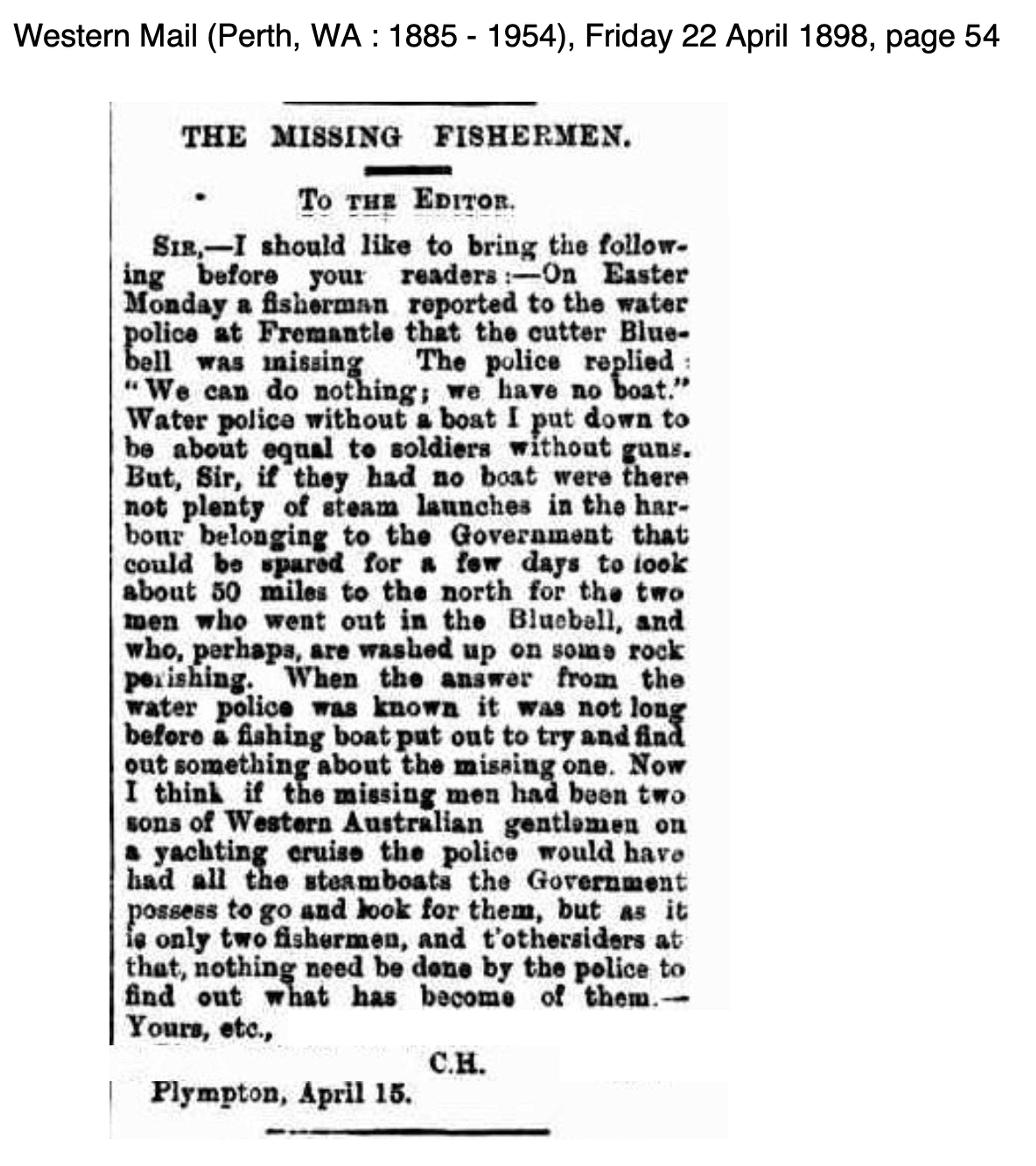Blue Bell
Vessel Name: Blue Bell
Thomas Atkins
Alec Klassen
Drowned at Sea; Bodies never recovered
31 March 1898

The Western Mail, Friday 22 April 1898
There is no indication of the size, or age, of the fishing boat Blue Bell, owned by Thomas Atkins. Atkins had only one crewman to assist him, a Dane named Alec Klassen. The boat was described as being substantial, and built of New Zealand kauri.
On Thursday 31 March 1898, the two men departed Fremantle on a fishing trip, intending to sail about 50 miles north to the snapper grounds. They expected to be away only four or five days, and return on the Sunday, or Monday. The vessel was said to be thoroughly seaworthy, and the two men were reported to be “first class boatmen, fully acquainted with every inch of the coast within some considerable distance of Fremantle” (Daily News, 13 April 1898: 4b).
No alarm was initially felt when they did not return at the expected time, as delays due to weather etc. were common among fishermen. When they had not returned by 12 April the matter was reported to the water police. However, the police had no boat to send on a search for the missing Blue Bell, so friends of the two fishermen raised money to instigate their own search.
The fishing boat, Petrel, was chartered, and two fishermen, Anderson and either Nelson or Wilson, left at 2.00pm that afternoon. They searched the coast for four days, as far north as Wedge Island, some 80 miles from Fremantle, and found no trace of the Blue Bell, or its crew.
There had been some heavy weather experienced along the coast soon after the Blue Bell sailed.
There does not appear to have been an inquiry into the loss of the Blue Bell, but it was reported in the newspapers that the opinion among fishermen was that it had sunk in deep water, either from springing a leak caused by the timber being eaten by worms, or shipping an unusually heavy sea.
In support of this contention they stated that the boat had four sectional hatches about 3ft. in length and 10in. in width, a water cask, and paddles aboard, some of which articles would most probably have been washed ashore and found by the search party if the Bluebell [sic] had been wrecked on any of the rocks or reefs adjacent to the portions of the coast searched by them (West Australian, 19 April 1898: 7d).
Both men were single, and Atkins was said to be about 30 years of age. He was from Victoria, and was reported to be the nephew of the Hon. Richard J. Seddon, Premier of New Zealand.
There were some Letters to the Editor published in the newspapers, which were scathing of the lack of reaction by the Government when the men were reported missing.
It was pointed out that only a few months previously a group of young men had sailed to Carnac Island, intending to return that afternoon. When they did not return as expected a steam launch was immediately sent to look for them.
The question raised in the newspapers was: why did that not occur on this occasion?
“The country has been put to heavy expense in providing a small fleet of steamboats of various sizes, among others the Victoria, Penguin, Waratah, Black-eyed Susan, and Cygnet.
To what extent these vessels benefit the colony it would be hard to say, but anyhow there is a pretty strong feeling abroad that the majority of them might be dedicated with decided advantage to a better use and purpose than idly ornamenting the wharves, river and bay the best part of the year, as is at present the case.
Now as the public have to contribute towards their upkeep, whether they return a penny to the revenue or not, why was not one or more of these State lay-at-anchor or hitched-to-the-quay luxuries despatched with as much expedition as possible on the humane and legitimate errand of determining, if possible, the whereabouts of the missing boat and men – a class of work for which most of them are particularly well adapted?...I think if the missing men had been two sons of Western Australian gentlemen on a yachting cruise, the police would have had all the steamboats the Government possess to go and look for them, but as it is only two fishermen and t’othersiders at that, nothing need be done by the police to find out what has become of them…So far as I am aware this is the first occasion on record in this colony that a cry from those in need of help has not been responded to by the Government, and it is to be hoped that in the name of all that is noblest and best in human nature, it will be the last (West Australian, 26 April 1898: 3b).
